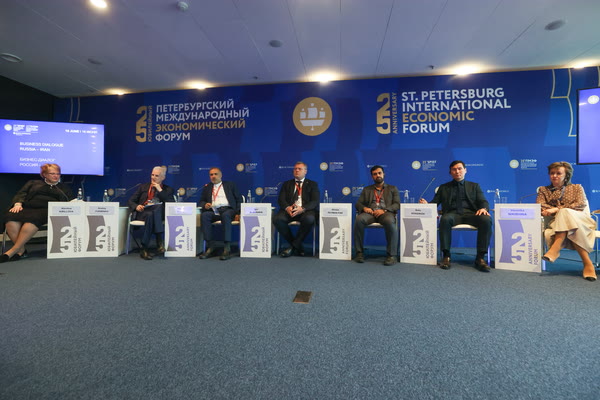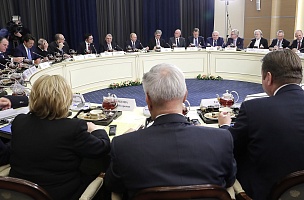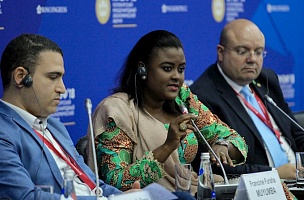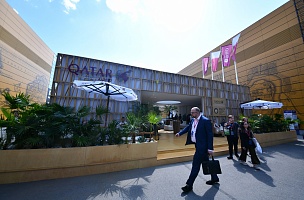Key conclusions
Russia and Iran are drawing together like never before in the two countries’ history
“We believe that relations between Iran and Russia have now entered a new phase, a new stage. And I don’t think there has been a time in history that Iran and Russia have been so close as in recent years. This is a big historical moment which we should take advantage of,” Kazem Jalali, Ambassador Extraordinary and Plenipotentiary of the Islamic Republic of Iran to the Russian Federation.
“Indeed, relations between our nations are strengthening at a very rapid rate, and what’s crucial here is that people from a vast range of areas are involved. Another crucial thing is that young people are involved too. Iran is a very young country, but possesses an incredibly rich history, and is home to outstanding young specialists,” Andrey Fursenko, Aide to the President of the Russian Federation.
“It seems to me that relations between Iran and Russia have now reached historical importance. There will be a great number of difficulties as we traverse this path – difficulties which we have already experienced. However, if we pool our experience, I believe we shall overcome them. Across a number of areas, we are encountering a range of challenges – for Iran, for Russia, and for the region as a whole. We, in turn, need to respond. If we stay united, if we act as one, if we apply ourselves with sincerity, then I think we will prevail very easily,” Reza Hajipour, Member, Majles (parliament) of the Islamic Republic of Iran.
There is significant potential for joint scientific ventures between the Russian Federation and the Islamic Republic of Iran
“Something which appears very important to me is the fact that specific projects are now off the ground. These are projects which are in our shared interests. They cover agriculture, new materials, and pharmaceuticals. I would like to point out that while being scientific projects, they are also absolutely practical in nature. I think that we will very soon see the emergence of new materials in the fields of crop production and poultry,” Andrey Fursenko, Aide to the President of the Russian Federation.
“It is very much our hope that there will be the chance to strengthen our partnerships across different areas, such as science and technology. I hope that our historians will be able to hold discussions too. <...> We are also working together in medicine, pharmaceuticals, and other areas of science and technology,” Reza Hajipour, Member, Majles (parliament) of the Islamic Republic of Iran.
PROBLEMS
High import duties and restrictions on trade transactions are having a negative impact on Russian-Iranian cooperation on trade and economic matters
“What is needed for trade and economic cooperation to develop in a more efficient way going forward? The potential is enormous. First of all, we need to focus on import customs duties, which are often a major barrier. We should not lose sight of the fact that the Iranian market has high import duties, sometimes prohibitively high. Under the current temporary free trade agreement, duties have been reduced for a narrow range of goods. Nevertheless, duties still exist. This is something we must address in the near future,” Veronika Nikishina, General Director, Russian Export Center.
“We are working on a relevant agreement with the EAEU <...> which will cover free trade. We want to sign this agreement on the creation of a free trade zone by the end of 2022. This will have an enormous impact on trade across various sectors, including industry and agriculture,” Alireza Peyman-Pak, Deputy Minister of Industry, Mine and Trade of the Islamic Republic of Iran.
Transport restrictions
“The International North–South Transport Corridor is of course a project which we hold regular meetings about. We examine what needs to be done – particularly with regard to the unfinished section – to launch this corridor as soon as possible. <...> Although a railway section remains unfinished – there is no connection – we have nevertheless not stopped work, and the International North–South Transport Corridor is in operation,” Kazem Jalali, Ambassador Extraordinary and Plenipotentiary of the Islamic Republic of Iran to the Russian Federation.
“In order to build trade between our nations, the corridor too is of strategic and vital importance to us. I am speaking about the International North–South Transport Corridor. Naturally, we must work apace to develop this infrastructure,” Alireza Peyman-Pak, Deputy Minister of Industry, Mine and Trade of the Islamic Republic of Iran.
“The underutilization of our port capacity – which is 16 million tonnes per year – is an evident problem. There are some problematic stretches of the Volga-Caspian Canal where the depth is literally 3–3.5 metres. In order to satisfy shipping companies and enable them to transport goods to the fullest extent, the depth needs to be 4.5 metres. Literally late last month, the Government of the Russian Federation passed a resolution to modernize the Volga-Caspian Canal and ensure a depth of 4.5 metres throughout. This initiative, which was supported by the President [Vladimir Putin – ed.] will enable us to count on an increase of goods being transported via our ports. This resolution was well received in Tehran,” Igor Babushkin, Governor of Astrakhan Region.
“We have said much about how we, together with the Iranian side, need to have an authorized agent or organization to handle issues related to customs and logistics at ports. This is very important,” Sergey Pavlov, First Deputy Managing Director, Russian Railways.
SOLUTIONS
Boosting interregional cooperation
“Astrakhan is Iran’s gateway to the Russian Federation, and given our proximity to the Caspian Sea, Astrakhan is a very important region to us. <...> In addition, the Head of Kalmykia cited the creation of a port as one of his major projects. I think this will also be an excellent port on the Caspian Sea. It will do a great deal to boost relations between our countries,” Kazem Jalali, Ambassador Extraordinary and Plenipotentiary of the Islamic Republic of Iran to the Russian Federation.
“There is another very important aspect on today’s agenda, and that is of course relations in trade and industry. These are crucial. In the main, all the potential is concentrated in the centre. However, we believe that there is also great potential in the regions in terms of industry and agriculture. We have reached an agreement whereby we will foster interregional cooperation and forge ties between our regions,” Alireza Peyman-Pak, Deputy Minister of Industry, Mine and Trade of the Islamic Republic of Iran.
“Today, we are working hard on the North–South Transport Corridor, and are directly incorporating our port capacities and the potential of the Volga-Caspian Canal. There are more than 120 companies in Astrakhan Region with Iranian capital,” Igor Babushkin, Governor of Astrakhan Region.
“In fact, there is still room to grow in terms of relations across a wide range of industries. In this sense Kalmykia is already involved in the field of education. A number of students from Iran are studying at Kalmyk State University – a key higher education institution in Russia’s south. We work together in agriculture, culture, and even sport. It all starts with the simple things – we just need to visit each other’s regions more,” Batu Khasikov, Head of the Republic of Kalmykia.
Strengthening B2B ties between the two countries
“As we have explained on numerous occasions to our Russian colleagues, in order to boost trade, we need to address the lack of knowledge that our entrepreneurs have regarding the excellent potential and opportunities that exist. What could help in this regard is an exchange of delegations – business missions. This is a vital aspect, and will of course raise awareness. The biggest delegation we sent in the last three months was to Russia, and we held some excellent meetings,” Alireza Peyman-Pak, Deputy Minister of Industry, Mine and Trade of the Islamic Republic of Iran.
“We at the Russian Export Center are planning to organize a minimum of 14 business missions by the end of the year. Five of these will be in June–July. What’s more, these are not only business missions to Iran featuring Russian exporters. We know the needs of Russian companies, and are well aware of the major industrial potential of Iran. We are therefore currently also organizing business missions the other way round. This is important in terms of lost shipments to Russia as a result of sanctions. We know for sure that Iranian companies can fill this gap. Indeed, we now have a very specific set of actions to take in terms of industries and business missions,” Veronika Nikishina, General Director, Russian Export Center.
For more information, visit the Roscongress Foundation’s Information and Analytical System at roscongress.org/en






